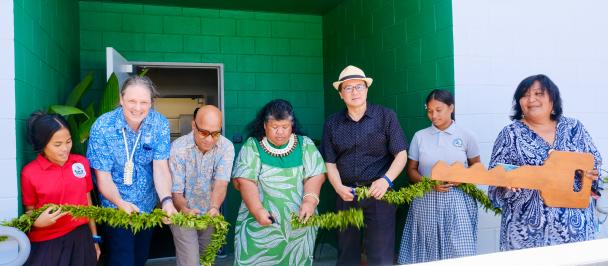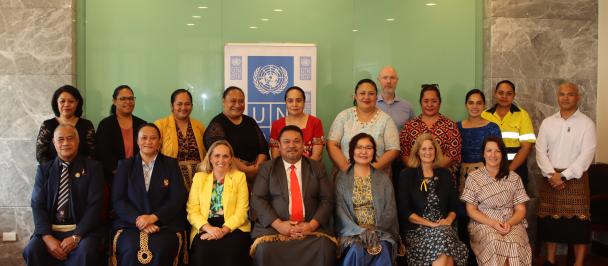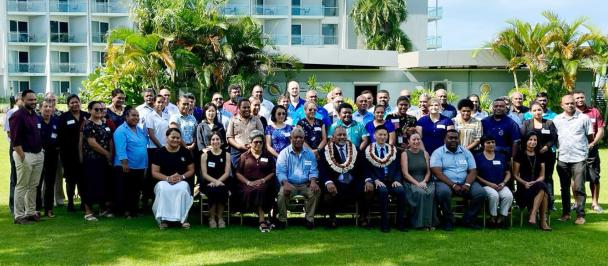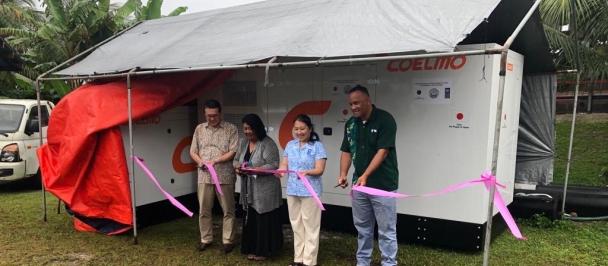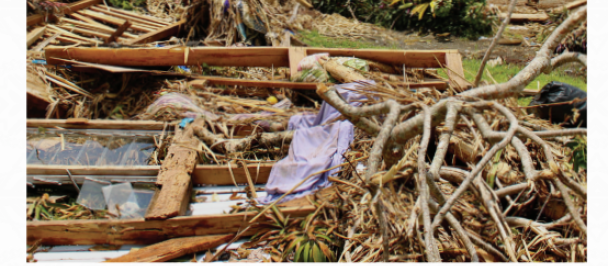Capacity development for RMI Water Governance through National Drought Contingency Plan Workshop
May 19, 2023
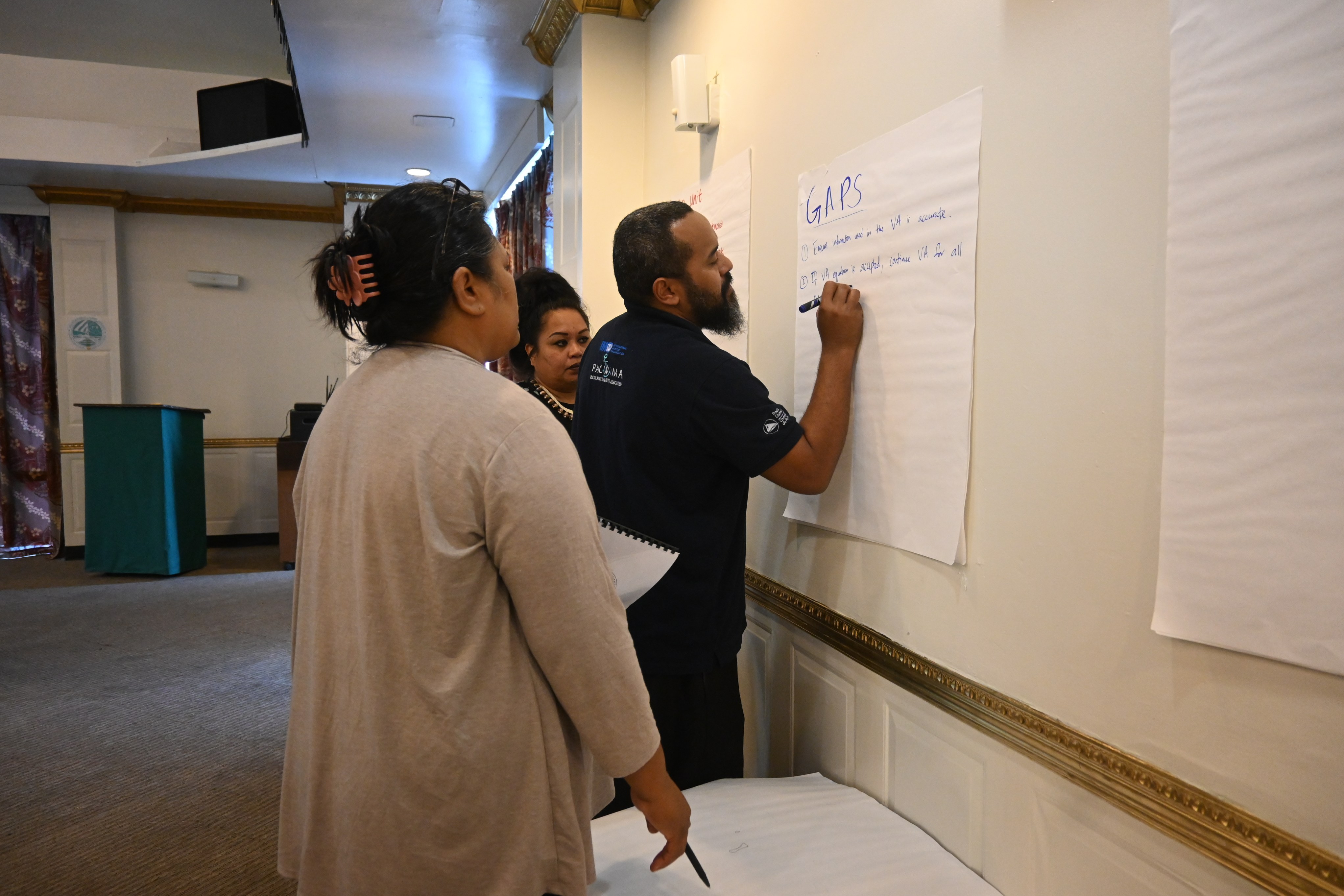
Listing feedbacks from workshop participants on drafted national drought contingency plan.
Majuro, Republic of the Marshall Islands - Strengthening technical capacities of national and subnational institutions and stakeholders was the focus of a recent National Drought Contingency Plan (NDCP) Validation workshop in Majuro, Republic of the Marshall Islands.
The workshop organized by the United Nations Development Programme (UNDP) through the RMI Addressing Climate Vulnerability in the Water Sector (ACWA) Project focused on validating comments, incorporating feedback, undertaking participatory exercises to fill gaps, and ensuring clear understanding of the NDCP document.
A total of 30 participants consisting of three female youths, 10 women, 14 men, an elder, and two people with disability representing various stakeholders including national and sub-national government agencies, women, youth and people with disability, nongovernment organisations, international organizations and donors.
The aim of the NDCP workshop was to ensure feedback was provided to the drafts and previous drafts fully incorporated and adequately reflected all issues and concerns in the final version of the NDCP.
National Disaster Management Office (NDMO) Director, Isidore Robert, provided welcome remarks on behalf of Chief Secretary Kino Kabua. He acknowledged the donors -Green Climate Fund, the Australian Government, UNDP and all partners and stakeholders for supporting and participating in this first Validation workshop.
Director Robert highlighted ongoing efforts of the RMI Government to tackle the intensified droughts. He added that proper documentation of contingency plan is essential through this workshop and receiving all comments, feedback, and concerns to be captured and reflected inclusively to make the National Drought Contingency Plan document official.
UNDP Team Leader for Resilience Sustainable Development Programme, Justin Shone acknowledged the strong leadership from the Government of RMI led by Chief Secretary and NDMO for drought preparedness and emergency response.
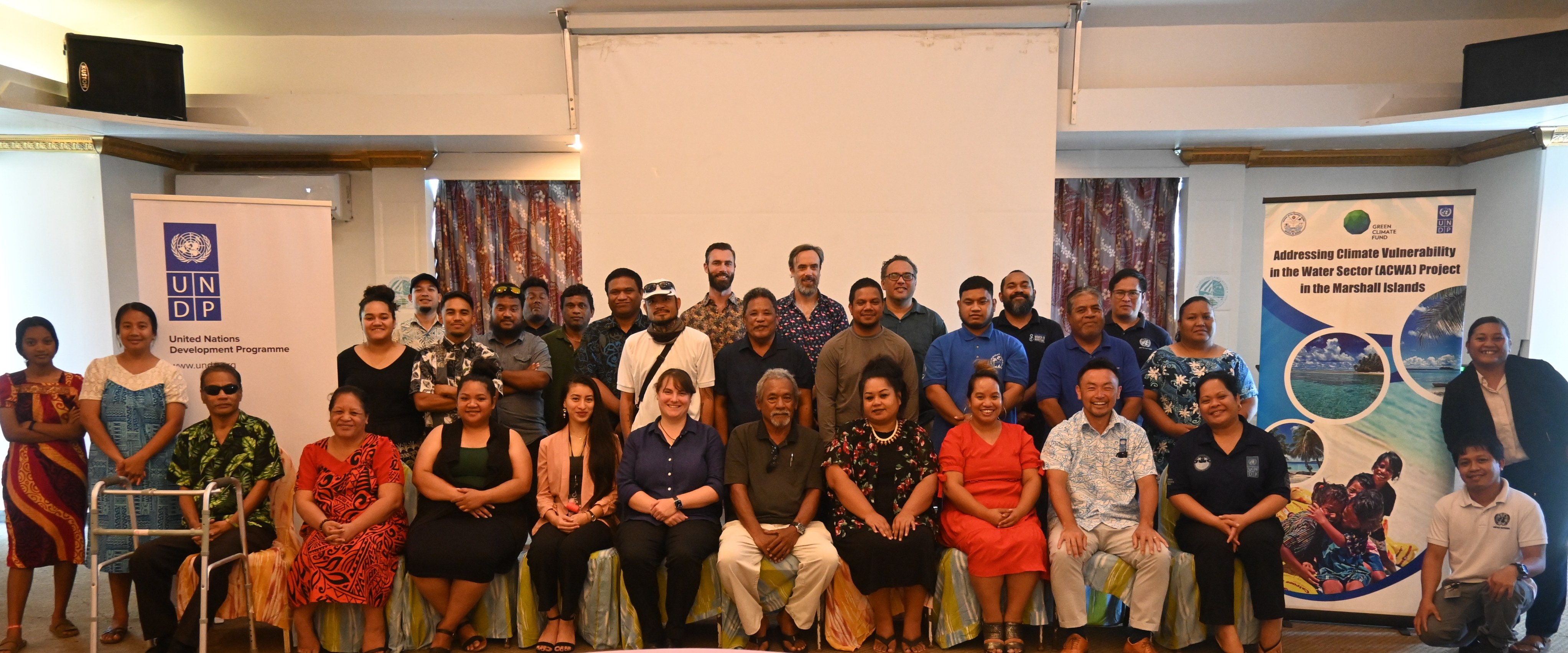
Participants at the National Drought Contingency Plan Workshop in Majuro.
NDMO has accomplished much in response to disasters and providing appropriate actions and solutions to challenges faced by disasters.
“NDMO has an impressive track-record in management and response to disasters. The Green Climate Fund and Australian Government supported ACWA project under the leadership of the Government of RMI. The formulation of the first ever RMI National Drought Contingency Plan is supported through this validation workshop to secure inputs from the key stakeholders in RMI.”
In her remarks, the Australian Deputy Ambassador Caroline Reid said that she was pleased to be in the workshop representing the Australian Embassy on the important discussion, and to listen and learn about National Drought Contingency Plan.
She said, “Tackling climate change, globally and with our partner here in the Pacific is a key priority of the Australian Government and we do have our own challenges and lessons with water security and drought in Australia.
“We are conscious of the challenges faced by RMI. Therefore, Australia is pleased to have provided funding in supporting the ACWA PLUS+ project to extend household and community level interventions, especially in neighboring islands.”
During the workshop, three key areas were highlighted in the final draft document.
One of the group activities focused on feedback from the participants on how to conduct community drought contingency planning (CDCP). The question: In anticipation of community drought contingency plan, what do community stakeholders need, what questions to ask and what sort of activities are to be done during community consultation?
The result shows feedback and concerns from participants, these include:
- Communications training is a must to build capacity in response to any type of emergency.
o Standardized template and training protocols on communication during peace time and emergency or disaster.
o Community to have a directory of all points of contacts from the sub-national to the national level. - Atoll or community profile to be updated periodically;
- Document traditional knowledge on predicting weather patterns, use of groundwater wells and how they prepare, respond, and recover from drought.
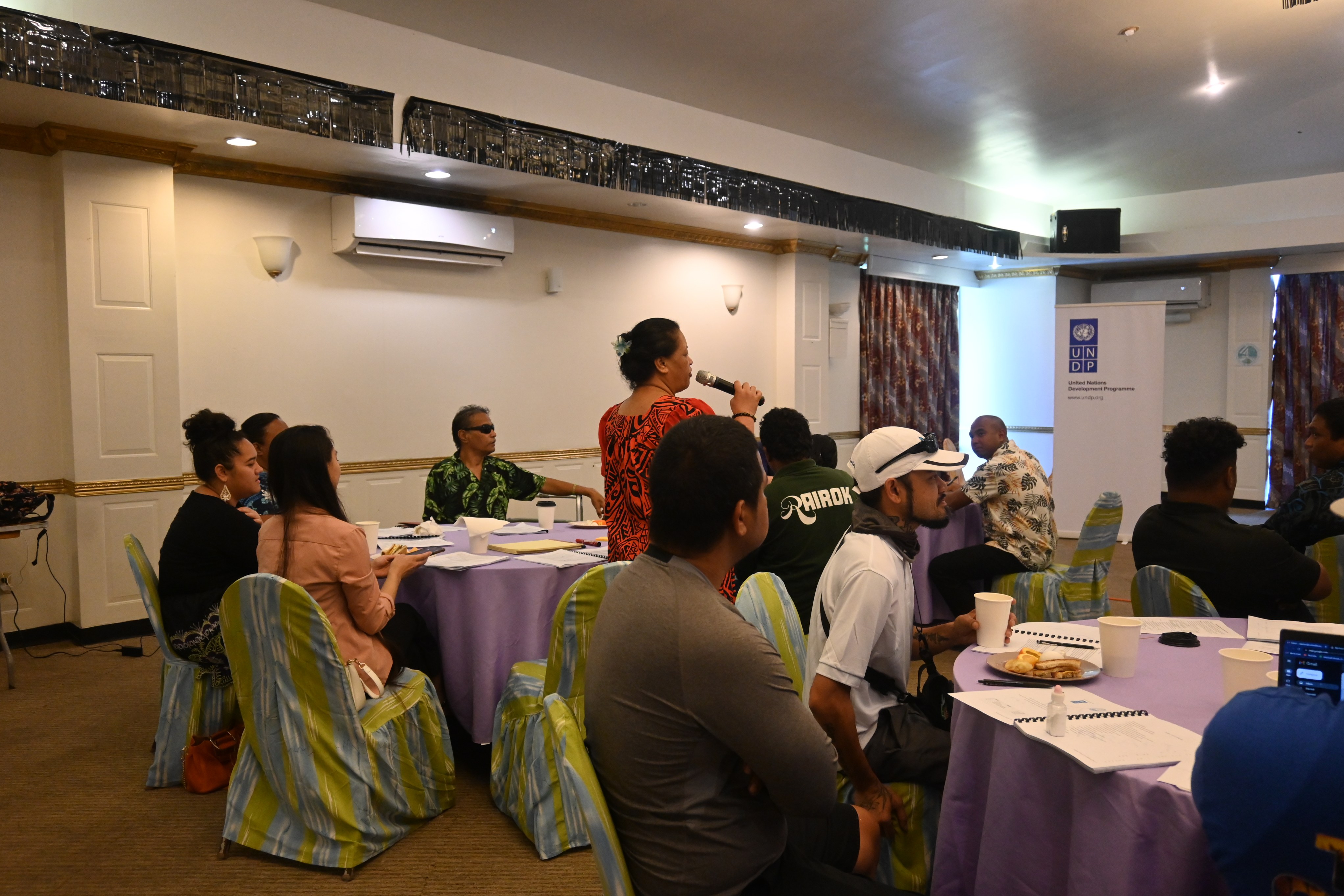
Workshop participant providing comments on drafted national drought contingency plan. (Photo: UNDP/Yolanie Johnson)
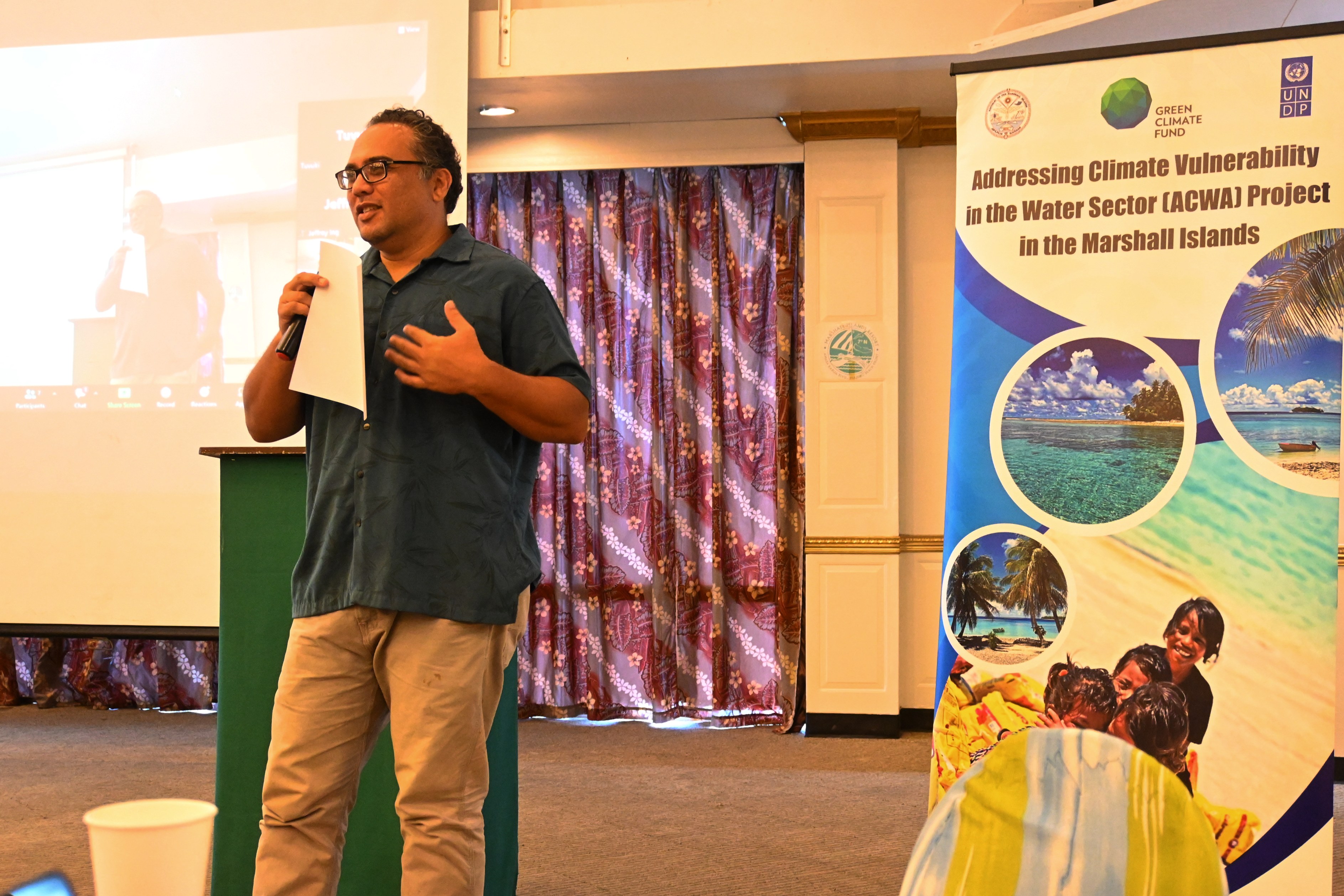
Workshop facilitator delivering presentation of national drought contingency plan. (Photo: UNDP/Yolanie Johnson)
Periodical stock take on HH water catchment and community water catchments.
- Build capacity in the community on preparedness, response, and recovery for drought.
- Using Wotje Drought Management plan as a basis of developing CDCP.
Another key point highlighted during the workshop was on the Community Water Committee (CWC) and Disaster Committee (DisCom). Questions and recommendation raised by participants include:
- Need to ensure roles and responsibilities of the two committees (CWC and DisCom) do not clash and become conflicted.
- Need SOPs for Government to declare drought or response to drought.
o E.g., when to declare for emergency or disaster;
o What’s the threshold to be considered as a drought;
Meteorologist and RMI Deputy Director for NOAA National Weather Service, Lee Jacklick, said, “It was a beneficial workshop, and I am pleased to see the draft National Drought Contingency Plan is finally documented and reviewed by all the key stakeholders. Although drought is a recurring climatic event in RMI, proper documentation, such as the Drought Contingency Plan outlining Standard Operating Procedures, was lacking. With such a plan, NDMO will be better positioned to strategize its drought monitoring and better prepare its national response effort to water supply shortages throughout RMI."
In his closing remarks, NDMO Director, Isidore Robert, congratulated the proactive participation and feedback from all participants. He also highlighted the importance of continuing engagement with all stakeholders upon reflection of all comments and feedback to shape the drafted RMI National Drought Contingency Plan.
The half day workshops took place on 27 April 2023 at the Marshall Islands Resort in Majuro.
For more information:
Koji Kumamaru (Ph.D), ACWA Project Manager, UNDP; email: koji.kumamaru@undp.org

 Locations
Locations